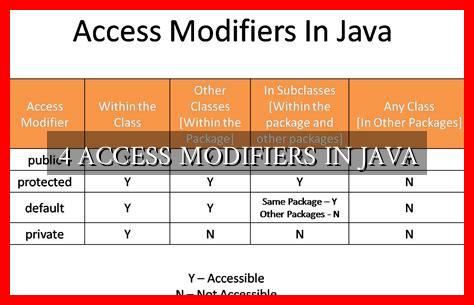-
Table of Contents
4 Access Modifiers in Java
When working with Java programming language, access modifiers play a crucial role in controlling the visibility and accessibility of classes, methods, and variables. Understanding the different access modifiers available in Java is essential for writing secure and maintainable code.
. In this article, we will explore the four main access modifiers in Java and discuss their usage and implications.
1. Public
The public access modifier is the most permissive of all access modifiers in Java. When a class, method, or variable is declared as public, it can be accessed from any other class in the same package or from any other package. This means that public members are visible and accessible to all classes.
Example:
“`java
public class MyClass {
public void myMethod() {
// Method implementation
}
}
“`
- Public members can be accessed from anywhere in the program.
- Public classes can be subclassed by classes in other packages.
2. Private
The private access modifier restricts the visibility of a class, method, or variable to only the class in which it is declared. Private members are not accessible from any other class, even subclasses within the same package.
Example:
“`java
public class MyClass {
private int myVariable;
private void myMethod() {
// Method implementation
}
}
“`
- Private members are only accessible within the same class.
- Private classes cannot be subclassed by classes in other packages.
3. Protected
The protected access modifier allows a class, method, or variable to be accessed by classes in the same package or by subclasses in any package. Protected members are not accessible by classes that are not in the same package or are not subclasses of the declaring class.
Example:
“`java
public class MyClass {
protected int myVariable;
protected void myMethod() {
// Method implementation
}
}
“`
- Protected members are accessible within the same package and by subclasses.
- Protected classes can be subclassed by classes in other packages.
4. Default (Package-Private)
The default access modifier, also known as package-private, is the absence of any access modifier. When a class, method, or variable is declared without an access modifier, it is accessible only within the same package. Default members are not accessible by classes outside the package.
Example:
“`java
class MyClass {
int myVariable;
void myMethod() {
// Method implementation
}
}
“`
- Default members are accessible within the same package.
- Default classes cannot be subclassed by classes in other packages.
Summary
In conclusion, access modifiers in Java are essential for controlling the visibility and accessibility of classes, methods, and variables. By understanding the differences between public, private, protected, and default access modifiers, developers can write secure and maintainable code. It is important to choose the appropriate access modifier based on the desired level of encapsulation and access control for each member. For more information on access modifiers in Java, you can refer to the official Java documentation.





